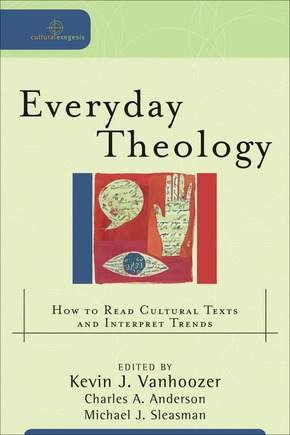As part of his Doctor of Ministry (DMin) in Ministry to Emerging Generations (Gordon-Conwell Theological Seminary), Tom’s written a number of book responses and given several short presentations (personal and group). In this series he not only “shares the wealth,” but also looks forward to your feedback as he refines his project: An argument for vocational discernment for graduate studies in the context of InterVarsity Christian Fellowship (Stay tuned to learn more!). Earlier posts on the program: Ministry to Emerging Generations and The Big Picture of Ministry to Emerging Generations.
Everyday Theology: How to Read Cultural Texts and Interpret Trends. Chapters 1, 2

Everyday Theology: How to Read Cultural Texts and Interpret Trends (Grand Rapids, MI: Baker Academic, 2007), edited by Kevin J. Vanhoozer, Charles A. Anderson, and Michael J. Sleasman, embodies the “theological lay of the cultural land” (7) and “Christian primer for cultural literacy” (11) I desire to inspire among members of InterVarsity Christian Fellowship’s Emerging Scholars Network. Vanhoozer, in collaboration with two co-editors from his first “Cultural Hermeneutics” class at Trinity Evangelical Divinity School, offers “a book about everyday theology, written by everyday theologians for everyday theologians. . . . the reflective and practical task of living each day as faithful disciples of Jesus Christ” (7). How can I go about a similar endeavor of encouraging Emerging Scholars to apply the Bible to all areas of life (15), to love their neighbor in their cultural context (19)?
Over the course of the past ~ 2 years, the Emerging Scholars Network has been inviting scholars to engage in Scholars Compass: a devotional for academics by academics (http://bit.ly/ScholarsCompass). In addition to an online structure and editorial process, we have designed and led several related workshops. Many followers of Christ in higher education desire to explore the relationship of faith and vocation, not only academically, but also devotionally. We are currently engaging ~ 100 writers. A next step is to create a toolkit to deepen the Emerging Scholars interpretation of the signs of the times (Matthew 16:1-3) and spurring Emerging Scholars to grow in “cultural literacy, i.e., how to ‘read’ and ‘write’ culture . . . the ability to understand patterns and products of everyday life” (17-19). This includes refining the current structure through training hosted on Google Hangout, conversations at various national conferences (e.g., American Scientific Affiliation, Urbana Student Missions Conference), additional online features (e.g., editorial sidebars, book links, and a glossary, 11), and taking next steps in other forms of publication (e.g., devotionals developed and shared with Global Scholars). Some whom we engage know much more about cultural literacy than we do. As with Everyday Theology, I look forward to learning from them. For those just beginning to delve into the Word of God, such opportunities will be rich next steps in their personal faith-vocation journey.
As “culture is made up of ‘works’ and ‘worlds of meaning’ with “porous boundaries” (26), it is important to engage in a dynamic conversation. We no longer live in the era of advancing final answers regarding faith and vocation, with attention given to a particular area and/or stage of study, to be passed down from one campus ministry generation to the next. I am excited about the prospect of a “Methodological Coda: Guidelines for Everyday Theological Interpretation of Culture” (59) to be engaged by our community of students, scholars, and staff. It is vital to wrestle with how culture communicates, orients, reproduces, and cultivates (28-32).
Although “Chapter 2: The Gospel according to Safeway: The Checkout Line and the Good Life” by Jeremy D. Lawson, Michael J. Sleasman, and Charles A. Anderson, is not vocationally applicable to Emerging Scholars, I appreciate its example of an unavoidable facet of life.
Christians need to realize the impact that the media has on us, even in the grocery store. Just like the Matrix, it has us; it is all around us. Being wise as serpents means we understand what the check-out line good life proposes and commit ourselves to seeking the good life that Christ himself makes possible and embodies. Though we find ourselves “in” the checkout line, we must not be “of” the checkout line (79).
I am disappointed that Everyday Theology does not include a chapter on education. I skimmed the chapter on blogging and was surprised how most of the 2007 piece continues to be applicable today. In the future I desire not only to explore the resource further, but also to continue to recommend it to others 🙂 If you have interest in reviewing it further, please let me know. Thank-you.
To God be the glory!
Tom enjoys daily conversations regarding living out the Biblical Story with his wife Theresa and their four girls, around the block, at Elizabethtown Brethren in Christ Church (where he teaches adult electives and co-leads a small group), among healthcare professionals as the Northeast Regional Director for the Christian Medical & Dental Associations (CMDA), and in higher ed as a volunteer with the Emerging Scholars Network (ESN). For a number of years, the Christian Medical Society / CMDA at Penn State College of Medicine was the hub of his ministry with CMDA. Note: Tom served with InterVarsity Christian Fellowship / USA for 20+ years, including 6+ years as the Associate Director of ESN. He has written for the ESN blog from its launch in August 2008. He has studied Biology (B.S.), Higher Education (M.A.), Spiritual Direction (Certificate), Spiritual Formation (M.A.R.), Ministry to Emerging Generations (D.Min.). To God be the glory!

Leave a Reply